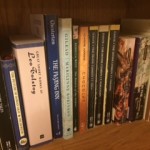Literature adds to reality, it does not simply describe it. It enriches the necessary competencies that daily life requires and provides; and in this respect, it irrigates the deserts that our lives have already become. (C.S. Lewis)
I lurk on a few writers’ online message boards, and the other day someone posted about his dislike of “literary fiction” (as opposed to “genre fiction,” such as historical or mystery novels). Several subsequent responses showed this abhorrence to be common.
Now, my stories have been described by some as literary, which I take as a compliment, even if my first publisher for marketing purposes insisted The Third Grace be categorized as a “contemporary women’s” novel (in other words, genre fiction).
It’s true that literary fiction’s often depressing realism is based on a pessimistic and even nihilistic worldview. I’ve run into lots of such writing (more often Euro-Canadian than American, for some reason) that’s just plain hard work to read. And as for short stories, even many Christian literary journals valued for their high quality of writing celebrate the edgy over the orthodox, demanding a level of artistic and academic snobbishness that can be very intimidating, so that we ask:
- “What if I don’t ‘get’ the story’s point?”
- “What’s with the big words?”
- “Does this writer think she’s better than I am?”
I sometimes wonder if there’s a contest going on among literary writers to use the most arcane vocabulary. (See how I did that—slipped in the word “arcane,” meaning understood by few? Admission: I actually had to look it up to double-check its meaning. But then, I like the dictionary.) What makes fiction literary, anyway?
Wiki says:
Literary fiction is a term principally used for certain fictional works that hold literary merit . . . works that offer deliberate social commentary, political criticism, or focus on the individual to explore some part of the human condition.
Literary fiction of this sort, fuelled by Christian thinking, can create real and enduring works of art.
Goodreads places some of my favourite books onto its literary shelf:
- Pride and Prejudice (An excellent commentary on the society of Jane Austen);
- Memoirs of a Geisha (Took me right back to the Japan I visited in the 1970s, immersing me in the country’s ancient culture and giving me insight on its foundational beliefs);
- The Book Thief (Oh, the pathos!);
- Room (Wow, have you read this creepily wonderfully horrifyingly entertaining novel?);
- Water for Elephants (Historically amazing; I’m using the basic time-flash structure of this one for my current work-in-progress);
- All the Light We Cannot See (My top read of the year; I recommend it to everyone—along with The Boy in the Striped Pajamas—for insight into realities of WWII);
- Poisonwood Bible (I ground my teeth through Kingsolver’s underlying message and disdain for faith, but the literary merit was fantastic, and it all caused me to think about how I myself would have written her story).
And so on—you get the idea.
Huffington Post makes a good point in an article on literary versus genre fiction:
In essence, the best Genre Fiction contains great writing, with the goal of telling a captivating story to escape from reality. Literary Fiction is comprised of the heart and soul of a writer’s being, and is experienced as an emotional journey through the symphony of words, leading to a stronger grasp of the universe and of ourselves.
We all have our own tastes and opinions when it comes to writing and reading. Well-crafted genre fiction is fantastic for entertainment, and I devour it at night or on the beach. But I really value literary fiction based on a soundly biblical worldview, and I wish many more Christians would set their sights on writing literarily in order to introduce the gospel of Jesus Christ (not blatantly but thematically and symbolically, evangelizing through the back door of story) to an audience thirsty for literature that takes them into deeper meaning—perhaps back to the Bible itself.
Who better than Christians to comment on culture, politics, the human condition? Who more prepared than Christians to bare heart and soul in emotional journey that explains the universe and ourselves?
YOUR TURN:
- What fiction have you read lately that touches you deeply?
- Do you shy away from reading literary fiction and, if so, why?
- What novel, for you, is the perfect blend between “entertaining” and “meaningful”?
